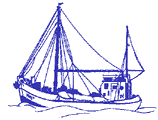Conclusionbottom
When "Save the Elbe" planned the action at the shareholder meeting, we did not imagine to travel to the Ok Tedi. To us it was an abstract argument, used in the real world of Hamburg in our real feud with Affi, following the principle: think globally, act locally. When we came out of the talk with the head of Affi, Dr. Marnette, who had proposed to send a delegation to PNG, we looked at each other: what shall we do, if he was serious? Could we achieve anything on that journey, to justify the addition of tons of greenhouse gas to the atmosphere? What we did achieve, and what we did notIt was demonstrated, that a well prepared shareholder action will raise public awareness. The company leaders could not ignore the problem. The tool of shareholder action is not developed in Germany, as it is in other countries, so our action may encourage others. Affi may not claim to be sustainable and environmental friendly, but in contrast it has to be concerned, that the bad image of mining may stain its appearance. At a public lecture within the "Sustainable Metals" project at Hamburg, Dr. Marnette warmly appreciated the idea, to get an eco-rating for his company. As long as Affi contracts ore concentrate from Ok Tedi, it cannot be rated A1.Affi will not use economic force, namely not to buy ore concentrate, to urge OTML to improve environmental protection. The crooked argument is, that the ore would be sold to another company and smelted under worse conditions than at Affi's. This calculation is not complete, however, because Affi would buy ore elsewhere, which was not processed cleanly so far. OTML showed no change of mine waste management. They are not impressed by just (sweet) talk. OTML expressed its concern, that without Affi as a reliable customer, ore concentrate would have to be sold less profitable, and thus budgets for environmental protection and social development would be cut. It is a cheap argument of both companies, to justify the bad, because things could be even worse. Affi recognized its responsibility for the conditions, under which the copper ore is mined, that is processed at their plant. Affi tried to gain influence on the Global Mining Initiative, but GMI did not answer to this proposal. Affi assists a health care project in the Ok Tedi region. However, Affi's effort does not aim at the time after mine closure, when help will be needed most. It is possible, to open a discussion on a product like copper, where direct customers have no choice, like with forest products. The Evangelical Church in Germany may raise the issue as an ethical question. The information gained on our travel are made available to environmentalists
envolved to the Ok Tedi issue. We will provide an up-to-date compilation
of our own text, videoclips, and pictures, mapping, internet links, and
documents of BHP, OTML, World Bank, and MPI on CD-ROM and on WWW. We completed
the list of Affi's suppliers of ore concentrate, to give hints to environmentalists
in other countries but PNG. The role of German State agencies is outlined.
"Save the Elbe" will not expand its activities, to become "Save the Ok Tedi", nor become a "stakeholder" at PNG. We introduced Affi as a stakeholder to PNG. Still the target of our work is Affi, Hamburg, to make it a clean coppersmelter, from the mine to products to recycling of products. Ok Tedi is but an example, that environmental problems within the copper production chain must not be exported to foreign countries. top
|

